(or what I recall of it)
Moorgate History Part 2
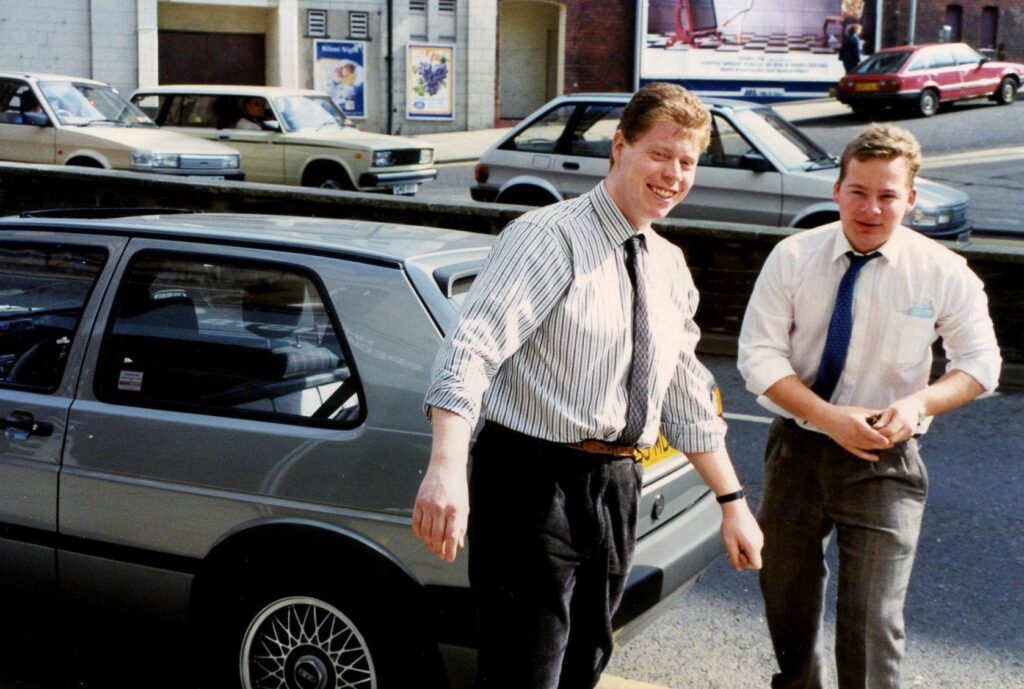
As we approached the middle of the 80's, Moorgate was still growing and starting to gain a good reputation among customers and suppliers alike. Keith's ideas about customer service, the move towards better equipment and the demo room all helped us spread the message. We'd developed good relationships with our core suppliers and we'd developed the habit of listening to our customers. We also learned from the trade body BADA and from those who were keen to grow the industry and improve the competence of their retailers. Also we learned from other retailers. What to do and what not to do.
I had joined the company around 1983 after working part time whilst doing my A levels. I am afraid at that point in my life I was far more interested in music, gigs, beer and the opposite sex (not in that order). Education was something I am ashamed to say was pretty boring to me at the time. The sixth form allowed me to indulge most of my other interests until it came to exam time. I got an A level in general studies and failed all the others much to the scorn of my teachers. I had no idea what I wanted to do with my life but was enjoying (mostly) working in the Rotherham store whenever I was needed to help out. I didn't particularly wish to work for the company full time but I sort of fell into doing just that, initially for the summer and then throughout the season.
Business used to be extremely seasonal and we'd do 70% of the yearly takings between October and March. This followed the show season, during which time we improved our stock, looked and listened to new brands and sharpened our swords for battle. By the time I stepped back and thought about what I wanted to do in the future I was already ensconced in Moorgate.
I don’t want to give you the impression that business was easy because I can never remember a time when it was. There were times when it was easier and there were times when it was fun. But easy doesn’t come into it. We’d endured the miners' strike and the massive impact brought on by the winding down of both mining and steel; two of the largest employers in Rotherham and South Yorkshire. We also had a city council that was making it harder and harder to park in the city centre and seemed unsympathetic towards the retailers that made the centre thrive. This will reappear as a common thread running through our entire history but starting particularly at this point.
Despite this we did our level best and met with some success. We measure success by paying our staff, and making a little money to plough back into better products and the business. There were no Ferraris and lap dancers.
We had some great staff back then too and it wasn't long before Keith invited Nigel Charlton to join us, initially part time. Nigel was an outstanding human being but he was also incredibly unpredictable. I may reveal stories about his time with us that will generate much mirth. He was older than me and had worked as a rep for Sansui, Rogers, Sugden and a few other companies. He was passionate about music which marked him as a little different from some of the reps. Surprisingly at the time many of the reps were not hi-fi enthusiasts as such but simply came from a sales background. We got to know Nigel and he would often come up with ideas about how we might do things. Sometimes these were outlandish and we'd never have done them in a million years. Other times he was bang on!
Nigel joined us part time (to fill in for his work with Rogers I believe) and to help us out. I learned an immense amount from him. It's difficult to describe him really but he was the exact opposite of my dad. Dad was quiet and fairly reserved and Nigel was the polar opposite. I learned a massive amount from both of them and tried my best to mix the two together. My dad was all about listening to the customer and then making suggestions backed by demonstration. Nigel was about entertainment and making the experience fun. He wanted to talk about music and whatever crackpot ideas he had rattling around in his fascinating skull. He told me that people buy from people and from people they like. That stuck with me.
Robert was a shopkeeper. He knew where everything was and was good at buying well and finding the styli that our local customers were always asking for. We used to sell hundreds of tapes and hundreds of styli. Accessories used to be almost 20% of our business. All the other electrical shops in the area didn't bother so they'd send all these folk to us and as a result the accessory side of our business grew. Because of his encyclopaedic knowledge and memory we liked to keep him behind the counter where he was happiest.
That left sales mostly to Nigel, myself and my dad, when he wasn't bogged down with the annoying red-tape and periphery of running a business. And this is a considerable amount! I learned quickly that everyone wanted to speak to my dad. And my dad was often busy with "other stuff" so I tried as hard as I could to introduce myself and explain that Keith perhaps couldn't help but I would do my best to try. It often worked. Other times my dad was needed.
Keith’s office was upstairs and as a result he was often absent from the shop floor. And yet so many people wanted to see him, often just to say hello and chew the fat. I took note of this but the gravity of it only came to me later when I realised that my dad was the "best man" and we were allowing him to bury himself in peripheral matters that often kept him away from the customers. Running a business generates unbelievable amounts of red tape and most of it has nothing to do with what the store is actually there for. This is increasing all the time, either to draw data from you or to find new ways to charge you, or penalise you for non-compliance. Dad was getting bogged down! Realisation of all this came later and it was actually some Linn training that crystallised this for me. It explained how your best people can be taken away from the shop floor and hidden where they can’t do good.
Naim Audio
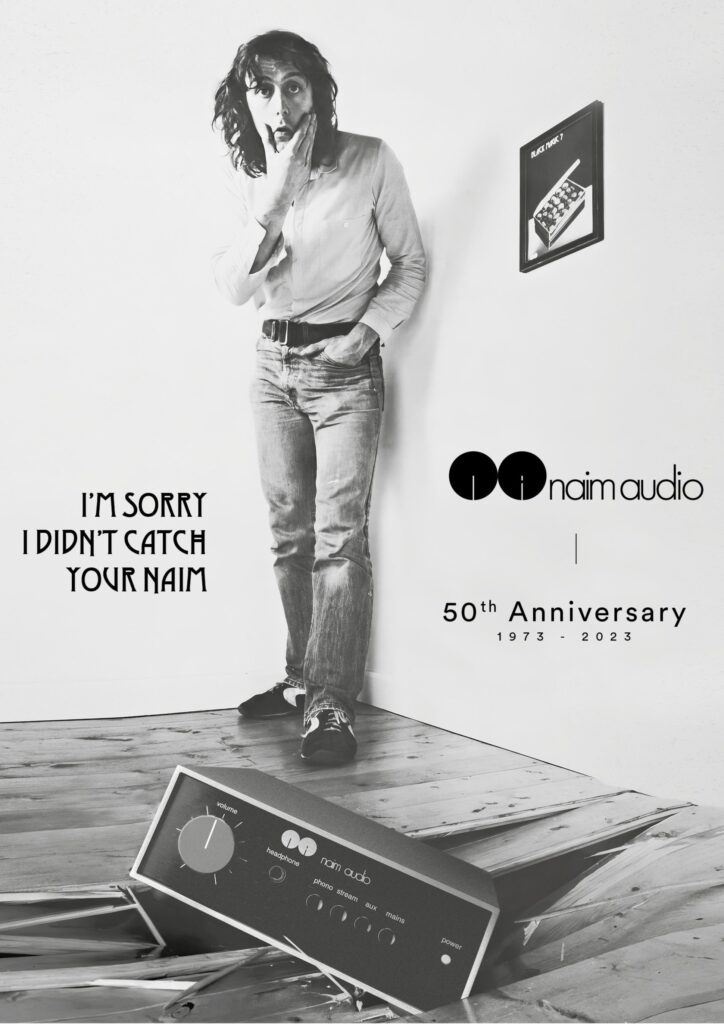
In 1986 I had a customer lend me a Naim amplifier. It was a 42/110 and he suggested I try it at home. Prior to this I had a Sugden A48 and I recall this had just been replaced by a Musical Fidelity Synthesis. There was something about the Naim that put a smile on my face although I couldn’t at the time put my fingers on what it was. I logged the knowledge away when I gave the amplifier back. Attempts to open accounts with Naim Audio (as well as Linn Products and Rega) were rebuffed however. More about that later and God loves a trier.
When not busy with customers we began to set things up to listen to and compare them in order to find out which combinations worked well and which didn’t. The demo room was the most useful tool we had. Instead of talking about products we could demonstrate them. It all sounds so obvious but we still do this today. In fact it pretty much underscores what we do.
We also learned from other retailers through BADA. Sometimes you’re too close to things to see what they really are. But it is a wonderful thing to learn from people who have done things and sometimes failed but other times succeeded. Talking to people from companies like Grahams, Brady’s and Audio T (to name but three) was a great way of seeing the whole market as opposed to just our own small corner of it. Sometimes you can’t see the wood from the trees. Great minds have a way of “stepping outside the situation” and looking in.
I met these people at BADA meetings. I found some were simply blusterers and others were eager to share ideas. Ignoring the blusterers (many in London were back then to be a success all you had to do was open your doors every morning) and focussing on those who were happy to chat and share served me well.
Mission

Mission was a brand we finally managed to get in our Rotherham store and it performed really well in the demo room. Shortly after that followed Cyrus, their electronics brand and initially part of one company. They were great products and were owned by the charismatic Farad Azima. Farad was a man who seemed able to cut to the chase of what the business was about and what the industry needed. He was a great public speaker and his presentations were gripping, refreshing and often enlightening. He also used to listen to what his retailers wanted and would hold regular meetings to discuss business and the coming season. He would talk and inspire but he would also listen and act. Very few of our suppliers do this. Even to this day. It was notable because it was quite unique.
The Mission factory was based in Huntingdon near Cambridge. This was an area critical to the hi-fi industry and the UK centre of a lot of electronics companies. Factory tours were wonderful events where we discovered the ethos, the people and the design behind products that were unique and exciting. The Mission 70, the 753, the 780 speakers and the Cyrus One and Two were also launched at the factory and we gained great products and insight into what made them tick.
I also developed one of my life's greatest friendships with their sales manager David Marchant. Dave was great company, a great wit and a great person to prop up a bar or to eat curry with. He would also strong-arm me into buying deals that would always enable him to hit his targets. I would then have to explain the stock to my dad and then set about selling it as quickly as I could. These were great products and it was never too much of a chore.
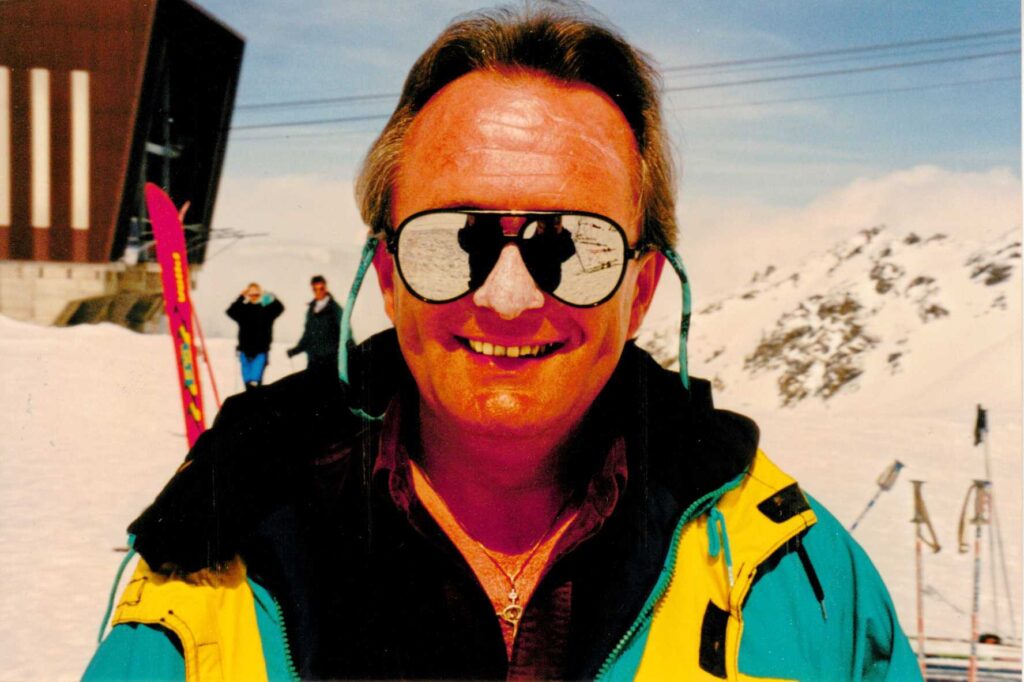
Suffice it to say David was a gentleman and a true character. He passed away a few years ago and is still missed by myself and all who knew him. I was also extremely saddened to hear of the passing of Farad Azima during the first covid lockdown. I frequently raise a glass to both of them. Farad taught me to ski, was a great friend and allowed me to look at things from a different perspective and seek out different ways of doing things, even if it meant working against the tide. He also told me not to waste my energy on fools. This has been an immensely useful piece of advice to me.
Paul Cooper joined Moorgate in 1987 and is still with us to this day. I knew him before he joined us and we shared a passion for rock music. I felt he was wasted in his job at the time and eagerly suggested he sit down with my dad for an interview. He joined us not long after.
Each new member of staff quickly learned what we were about. They spent a lot of time in the demo room, listening to products and shadowing demonstrations to hear what staff and customers had to say. They appreciated that listening to the customer and listening to equipment in a home environment was vital. I think that is because we have always chosen enthusiasts and music lovers first and foremost. I have read many CV’s but mostly disregarded all qualifications and looked for hobbies. No mention of music and there would never even be an interview. I can smell passion and a love of music from a mile off.
Sheffield
In 1988 my dad asked me if I thought we should open another store. I did some research and discovered that we were drawing a lot of customers from Sheffield. In fact it was a bigger figure than we all thought.
Not long after my dad asked me if I felt up to running the store should we find the right premises. I thought long and hard about it and eventually decided I’d like to try but only if I could find the right staff to work with me. I did a lot of thinking about this and a lot of soul searching. I wanted to do it for the company and I felt it could be good for me but I wasn’t really confident in my abilities. I have always been able to project confidence (I get that from my mum) even when I don’t feel it. I was 24 and I had a lot of sleepless nights over my casual “I’ll give it a go dad”.
Ian Blay came to us from a local electronics supplier and he used to call on us in that capacity. My dad and I thought him the perfect candidate and was delighted when he said yes. We never even interviewed him. I knew he had the warmth, enthusiasm and desire to help people that we were looking for. David Coleman came via an advert placed in the Sheffield Star. He was by far the best candidate and he got the job on the spot. He was a very capable person and a good listener. Both Ian and David were customer favourites and both very passionate about their music.
We eventually found premises we thought were ideal on Fitzwilliam Street in the centre of Sheffield and just off the bottom of the Moor. It was light, spacious and suited our purposes perfectly. To help with this we used a design agency to come up with something that was a little different. Now we could probably manage that ourselves but back then we were still green and lacking in confidence.
There was on-road and off-road parking outside. We would have two demo rooms and a large showroom. Once we had the designs for how the shop would look we approached our suppliers to ensure they would be happy with us selling their products in Sheffield. Fortunately the reputation we’d fought for meant they now said yes or at least agreed to come and take a look. Things had changed since we opened our store nine miles away to get the better brands.
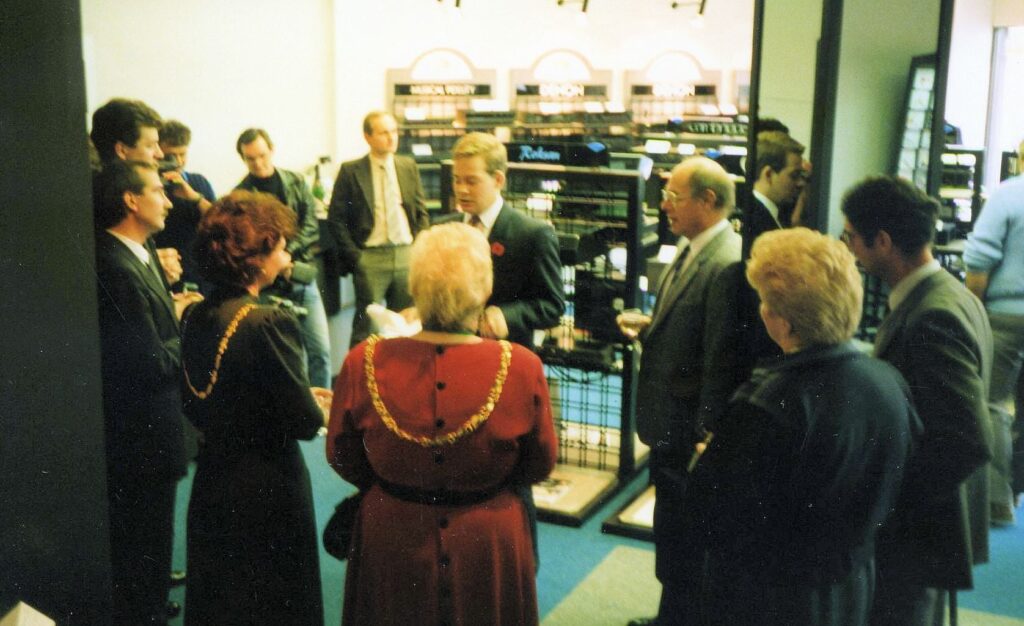
It didn’t take long to train our new people. We don’t and have never insisted on “an extensive knowledge of equipment” or solely employ people from within our industry. We saw it as our job to teach people about the equipment and how to look after customers. All we needed was passion and enthusiasm. You can’t teach those to people who don’t have it and often if you employ people from other shops you inherit their bad habits as well as good.
Moorgate Acoustics Sheffield opened its doors in 1989 after many aforementioned sleepless nights. I worried that people wouldn't come or that Sheffield already had enough shops. Indeed at the time it had 5. I also worried we had the wrong product profile and I worried over a thousand other things that were all irrational but ate away at my confidence. The realisation that the buck would have to stop with me and my dad was a half an hours drive away and would be busy with his own work.
I recall the opening day. Everything was bright and clean and well lit. Our store was a little different to the norm in that it was tidy and uncluttered. I got in early and as I opened the shutters a very elegant woman in evening wear looked in the window, smiled and walked off. Where she’d been until 7 in the morning I’ll never know.
Part of the store design was that my desk would remain IN the shop and I have never given in to the temptation to move it away into our office space. I still get bogged down by the increasing avalanche of red tape but I can almost always be found when customers (many of whom quickly became old friends) come in.
We’d made our 1st sale within ten minutes; a 4 tier hi-fi stand. It was the first of many that day and it put some of the butterflies to rest in my stomach. Even to this day they never go away completely, especially when we host musical events or open days. A few bad days and you start to think the market has changed, customers have gone elsewhere or the press have finally talked the market to a standstill. I am absolutely convinced that many people think running a business is easy and if you run a business you have some sort of staggering good luck. I find the harder I work the luckier I get and I wish more people could see the true reality of running a business in the retail sector. And more so today than ever before. I’ll get to that later.
I’m delighted to say that Sheffield did well. We all worked hard and it thrived. We had a staff dream-team and customers became regulars, rewarded us with their loyalty and allowed the business to continue. We also received long-awaited visits from the brands who had so far evaded our interest in stocking them. Maybe it was the second store, maybe it was the store itself or maybe it was just some synchronicity but within six months of us opening we had visits from Linn, Naim Audio and a short while later Rega Research. It did help that by then I owned an LP12 and a Naim amp myself and had great enthusiasm for their products.
LINN
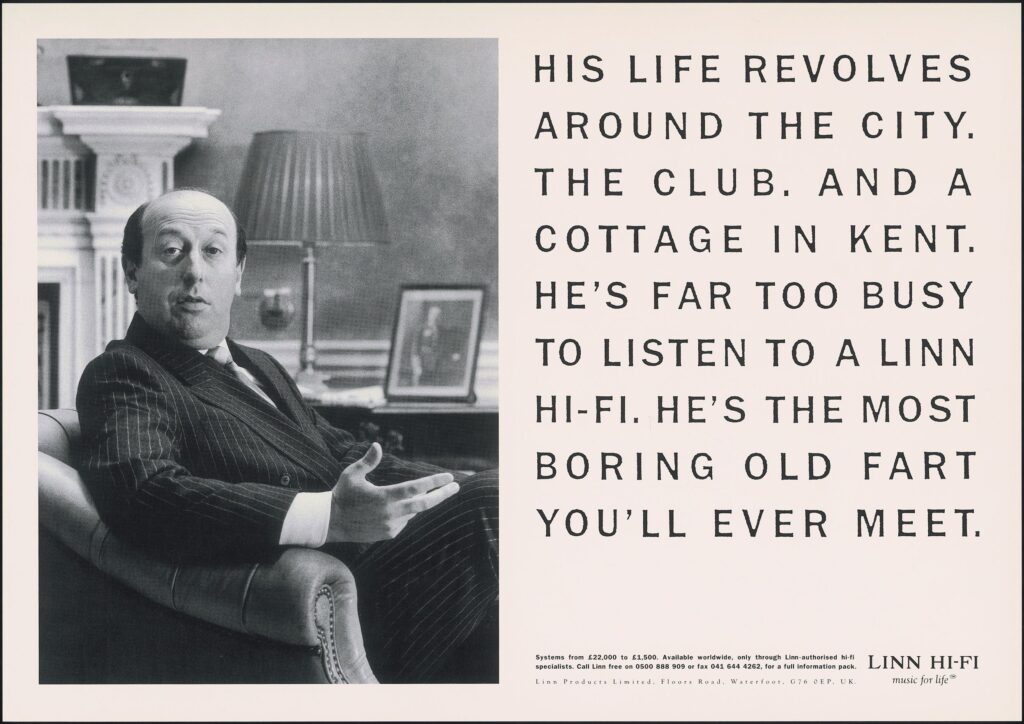
It was not a painless process taking on Linn in particular and to a slightly lesser extent Naim Audio. Both companies had their own way of working and their own philosophies and these were different from our own. They expected a lot more from us. It wasn’t just about “buying some stock and selling it”. Sometimes the learning curve was steep and at the time it almost felt like a religion. We understood “source first” but Linn had a degree of enthusiasm and strong core opinions. So we all decamped to the factory so that we could fully grasp these.
It was at Linn that I got my LP12 training. This gave me some understanding of how the turntable worked and how best it could be upgraded should the customer so wish. It also made me realise that a lot of the mystique around it was added by dealers and had nothing to do with the product itself. It was and is a relatively simple record player of great precision with a few do’s and don'ts. You didn’t need to be a guru to set it up but a little engineering understanding would do the trick.
One thing you had to hand to Linn was that they had the strength of conviction. They would bring every new product to our store and demonstrate it. They would always compare it against the products we felt were strongest in the market. They never shirked from this and they felt if the product impressed us it would impress our customers. I believe they were completely right in that regard and I wish more companies would follow their lead. Sometimes I wish they would follow their own lead and continue with this.
Linn also took us back to basics with regard to system set up. Most of this we knew but it was presented in an organised and coherent manner which gave us the tools to get better sound in the demo room and better sound at customers homes when we were installing. Better sound means better demos and happier customers.
Both Linn and Naim were also advocates of musical evenings and open days and they set a very high bar for these. They would ensure we got the products, the staff and the support to do these events and do them well. As a result they were successful and extremely well attended. I remember Neil Gayden from Linn hosting a lot of events at our Fitzwilliam Street store. And on one occasion Ivor himself came to do a presentation for our customers.
Hosting these events taught us a great deal. It wasn’t always easy and we all had to step outside our comfort zone, myself in particular. But the end result was that we learned a formula for many events to come and with many brands and products.
Naim were similarly different and immensely proud and enthusiastic about their products. Their amplifiers followed a (at the time) unique hierarchy which meant that the pre-amp initially took power from the power amp until such a time as a power supply was added. It wasn’t rocket science but it took some getting used to.
Not everybody is a fan of these two brands and I understand and respect that. But their influence on our industry (most of it positive) is notable and extensive and in some cases formed the template for high quality audio equipment and its retail for a long time to come. A lot of manufacturers took their ethos as the design for their own.
Finally both companies had remarkable factories that went some way to explaining why their products were so good.
British Audio
During this period of time (1988 to 1992) almost all of the big brands were British owned and this was something that brought my dad and I a great deal of pride. With the exception of Denon, Rotel, and a couple of others everything we sold was British designed and built. There are certain advantages to that. One is that the kit is built more locally and delivery times are quicker. It is also easier to get things sorted and fixed if an issue arises. Sometimes it also meant that the kit was better made and sounding. And it meant we could pick up the phone and speak to the person who had built the product.
Sadly as the 90’s marched on many of the brands we loved drifted into foreign hands. This wasn’t always bad but it did present challenges. Personally I would have preferred this not to have happened. Products manufactured closer to home and providing jobs for local communities seems to me to have always had advantages and never more so than now. But markets are driven by shareholders, investment companies, opportunists and asset-grabbers and not (as we might wish) audiophiles. China is a long way away if there's a problem that is complex or involved. I feel successive governments have reduced the exceptional skill sets we had and handed these to foreign companies that are often supported by their own companies.
As Sheffield grew we needed more staff. We added Richard Stocks from Super-Fi and Richard fitted in very well indeed. He was a likeable rogue and our customers liked him. We put him through all the training we and our suppliers could offer and he fitted right in.
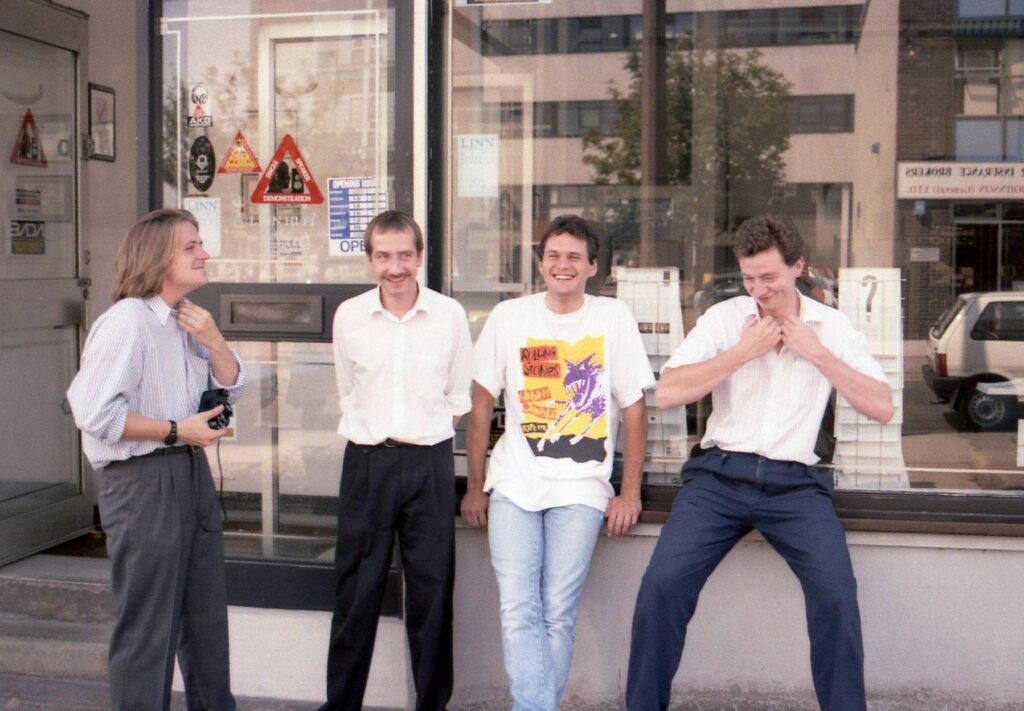
We work hard choosing our staff. Our customer relations are everything to us and so we guard the front lines and only allow the best people on it. So we train, explain, illustrate and then shadow staff. We allow them to sit in on demo’s so that they can see how we do things and how we like to respond to customers. We also try to ensure that all our staff “demonstrate” rather than explain. Explaining can be tricky especially with complex equipment, and almost abstract differences. Sitting people down, playing them music and showing them these differences is much more rewarding for all concerned.
Linn, Arcam and BADA (the British Audio Dealers Association) also started to offer training in retail. I’d taken a few years (day release) to do some education in business, computing and related nonsense. Some of it was even useful. I’d also attended a number of sales training courses and been given the job of packing it into bite sizes and passing it onto the staff. Or at least the parts that were relevant. Now we were getting offered very specific training that was at least part-tailored to our industry and its particular demands. We availed ourselves of this where possible. A lot of this was related to working well as a team. It was a mixed bag but we took something from every course we attended. Some of it related to the presentation of goods, the layout of the store and some on conducting demonstrations. I dislike scripted actions or formulas but there were good ideas buried in all of this and sometimes things that challenged how we thought. That is always good.
My dad always wanted the shop to be a low pressure environment and that’s something we have always worked hard to maintain. It should be a pleasurable experience coming into the shop. With this in mind you can see how a lot of sales training could be pretty tiresome. And if the demonstration is of the correct products then there’s very little sales actually required.
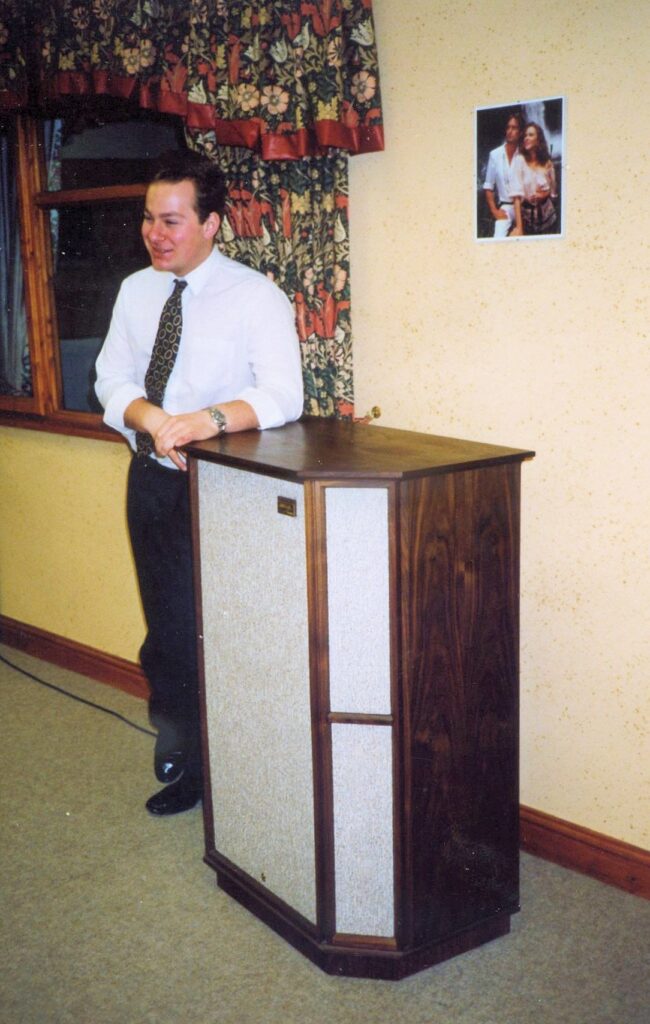
This is why we tend to choose staff who are music lovers, as opposed to salespeople. Music lovers share their enthusiasm and love of music whilst salesmen try and sell things. There’s nothing wrong with that and we wouldn’t be in business if we didn’t sell things. However there’s selling and there’s selling.
Home Cinema OR throwing the baby out with the bathwater
As the eighties gave way to the nineties we saw the arrival of Home Cinema and an increase in our involvement with BADA. Business was very good and we were established in Rotherham and Sheffield. Sheffield had become our flagship store but then again we had a much larger population to deal with and we also had parking outside the store. Parking had gotten so bad in Rotherham that some of our customers preferred to visit our Sheffield store simply because they could park. Councils have never made endless mistakes and I do not believe that they are not aware of them. I attended meetings with them to put forward our own point of view and found it like shouting into the wind. A wind of stupidity. Farad comes to mind again.
Stand out brands from this period;
Mission
Cyrus
Linn
Naim
Rega
Arcam
Spendor
B&W
Part 3 to follow.....
